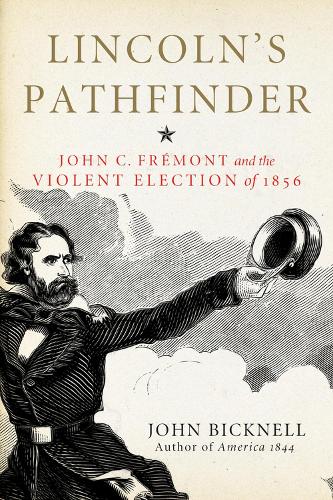
Lincoln's Pathfinder: John C. Fremont and the Violent Election of 1856
(Hardback)
Publishing Details
Lincoln's Pathfinder: John C. Fremont and the Violent Election of 1856
By (Author) John Bicknell
Chicago Review Press
Chicago Review Press
7th September 2017
United States
Classifications
General
Non Fiction
Elections and referenda / suffrage
Central / national / federal government
Political parties and party platforms
Political science and theory
324.97309034
Physical Properties
Hardback
320
Width 152mm, Height 228mm, Spine 25mm
635g
Description
The 1856 presidential race was the most violent peacetime election in American history. War between proslavery and antislavery settlers raged in Kansas; a congressman shot an Irish immigrant at a Washington hotel; and another congressman beat a US senator senseless on the floor of the Senate. But amid all the violence, the campaign of the new Republican Party, headed by famed explorer John C. Frmont, offered a ray of hope: a major party dedicated to limiting the spread of slavery. For the first time, women and African Americans actively engaged in a presidential contest, and the candidates wife, Jessie Benton Frmont, played a central role in both planning and executing strategy, and was a public face of the campaign. Even enslaved blacks in the South took hope from Frmonts crusade.
The 1856 campaign was also run against the backdrop of a country on the move, with settlers continuing to spread westward facing unimagined horrors, a terrible natural disaster that took hundreds of lives in the South, and one of the most famous Supreme Court cases in history, which set the stage for the Civil War. Frmont lost, but his strong showing in the North proved that a sectional party could win a national election, blazing the trail for Abraham Lincolns victory four years later.
Reviews
"At long last, a volume worthy of this critical but complicated election year. John Bicknell's original and engaging narrative weaves sophisticated analyses and personal stories--from statesmen to politicized women to enslaved southerners--into a fascinating account of this tempestuous era. Historical writing of the highest order." --Douglas R. Egerton, author of Year of Meteors: Stephen Douglas, Abraham Lincoln, and the Election That Brought on the Civil War
"John Bicknell's new book is not only the best book on the 1856 U.S. presidential election; it is really the only book on this interesting, important election." --Washington Independent Review of Books
"Mr. Bicknell, a former editor at Congressional Quarterly and the author of America 1844 (2014), tells the election story skillfully. . . But Lincoln's Pathfinder is about more than the making of the president, 1856." --Wall Street Journal
"Propelled by rich, vivid writing--with a veteran Capitol Hill observer's understanding of how deals get done and a scholar's eye for detail--John Bicknell's Lincoln's Pathfinder brings back to us, in all its glory and squalor, the 1856 campaign of the Republican Party's first presidential nominee, explorer John Frmont." --Tom Chaffin, author of Pathfinder: John Charles Frmont and the Course of American Empire
"John Bicknell captures the essence of this dramatic political contest that epitomized the struggle of a nation divided over slavery."--Civil War Book Review
"One of the best historical narratives of a campaign I have read," and, "this book is highly recommended."--The Weekly Standard
"Bicknell covers this crucial period in great detail with a fine writing style that is extremely readable... the author has a gift of being able to place readers in the midst of a fascinating and misunderstood chapter in American history." --Civil War Times Illustrated
"Bicknell is at his best in explaining how events get elevated into political symbols." --The Washington Free Beacon
"Bicknell offers a tidy narrative full of vivid political personalities of the time." --Kirkus Reviews
Author Bio
John Bicknell is the author of America 1844: Religious Fervor, Westward Expansion, and the Presidential Election that Transformed the Nation. He has written and edited for Watchdog.org, Congressional Quarterly, and Roll Call, and was senior editor of 2016 and 2018 Almanac of American Politics. He lives in Virginia.
